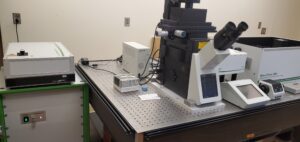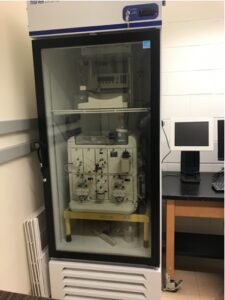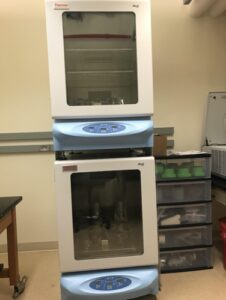Equipment
To study fast biological processes at a single-molecule level, our lab utilizes confocal microscopy with time-correlated single photon counting (TCSPC). We design single-molecule fluorescence-based assays to detect cleavage of nucleic acid substrates by enzymes and monitor dynamic biomolecular processes, such as unfolding. We use high-resolution cyro-EM structures from our collaborators at NIEHS to inform the placement of fluorescence labels, allowing us to monitor enzyme structural changes and interactions in real-time. In addition to time-resolved fluorescence microscopy and spectroscopy, our lab practices skills that involve sterile cell culture, protein purification, and single-molecule biophysics approaches.
Time-Resolved Confocal Microscopy

Our lab uses a custom MicroTime200 (PicoQuant) time-resolved confocal microscope capable of diffraction-limited single molecule imaging and high resolution photon timing. This system uses TCSPC, where spatially and spectrally filtered fluorescence photons are directed to detectors that have single photon sensitivity, and the arrival time of each detected photon is precisely determined. TCSPC enables simultaneous measurements, such as fluorescence intensity (diffusing molecules), fluorescence resonance energy transfer (FRET), fluorescence correlation spectroscopy (FCS), fluorescence lifetime imaging microscopy (FLIM), and pulsed interleaved excitation (PIE).
Fast Protein Liquid Chromatography

Fast protein liquid chromatography (FPLC) uses small-diameter stationary phases to achieve high resolution during protein characterization and separation. This technique includes high loading capacity, biocompatible buffer systems, quick flow rates, and stationary phases for typical chromatography modes, such as gel filtration, ion exchange, reversed phase, and affinity chromatography. The FPLC system in our lab is a BioRad NGC Quest Plus.
UV/Vis Spectrophotometer

UV-Vis spectroscopy is an analytical technique that measures the number of distinct wavelengths of UV or visible light that are absorbed or transmitted through a sample when compared to a blank sample. Our lab uses an Agilent Cary 3500 with multicell Peltier stage for temperature culture to characterize protein labeling and activity.
Incubated Shakers

Our lab uses the incubated shakers to perform E.coli cell culture and protein expression.